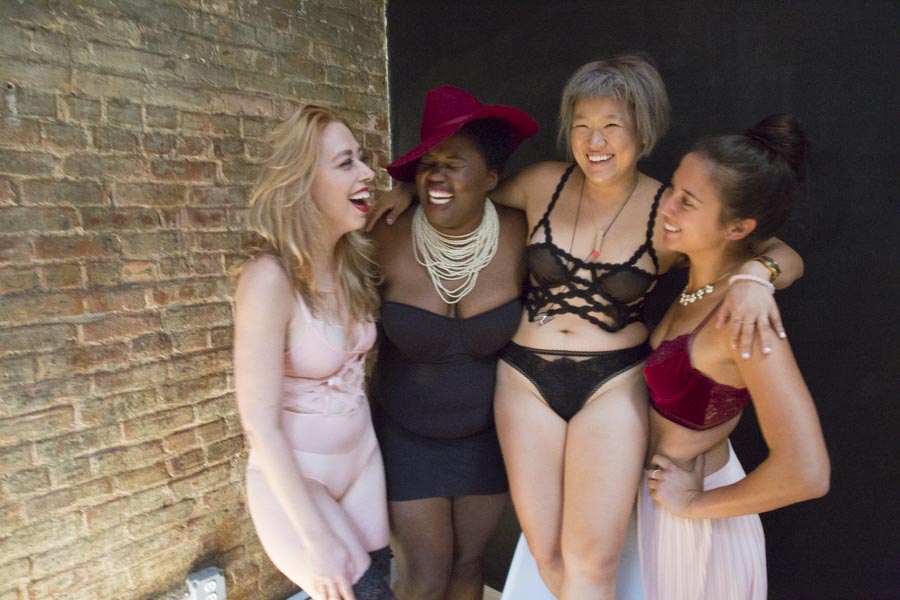When I made Unicornland, a series about a woman exploring her sexuality post-divorce, I committed to the cause of promoting #womeninfilm. Our 60% non-white cast and crew was also 70% female, and included many independent female rising stars.
Through producing and promoting the series, I have had many fascinating conversations with the female cast and crew about how their gender has affected their careers in film. These conversations will be published in a series of interviews.
Question: How has being a woman shaped your career, and your perception of the opportunities available to you?
NANA MENSAH (Actor/Writer/Producer, “Julianne” in Unicornland):
I hit it strong out the gate with three roles after graduating from acting school, but all the parts were that silent, asexual black woman. Black women being equated with strength annoys me. It robs me of the ability to be fragile, and that goes all the way to the casting office. This trope of black women being strong means we’re only cast as maids and slaves and people who are down on their luck.
I’m not a downtrodden person, and that’s why it’s taken me so long to hit my stride. My wellspring is an acerbic wit, emotional fragility, making bad decisions, getting drunk and dancing all night. Those parts usually go to white women.
This year, I took a chance on a very atypical play by Clare Barron (I’ll Never Love Again at the Bushwick Starr, March 2016). It turned out to be a total smash hit, both critically and at the box office. I played Clare (tiny, blond, blue-eyed) at 26. It was interesting for so much of New York to see me play a part that had nothing to do with color. I’m hopeful that it had something to do to change people’s minds.
LAURA RAMADEI (Actor/Producer):
It’s been trial and error. As a business person and a performer, you’re constantly confronted with questions of---should I play this part-slash-dumb underwritten-female-role because it’s a job, or should I turn it down for the sake of feminism? Those are difficult questions to ask every day.
MARCI MUDD (Production Designer on Unicornland):
I had a realization while working with a female designer that my job as art director was easier when I worked with a male production designer. I was second-guessed less because the producers and director didn’t second guess the (male) designer. Women have run the most organized and innovative art departments I’ve worked in so far, but there’s less trust from the top.
Over time, women expect to not be respected. Their approach—and I’m guilty of this as well—is from a place of being sorry to ask for what they need. Men are confident asking for what they need, but when a woman has that confidence it comes across as pushy or hysterical.
ERICA ROSE (Assistant Director on Unicornland):
It’s really unfortunate how little we see female sexuality presented by female creators, and through a female protagonist. We’re inundated with images of female sexuality in media—more than any other sexual identity—but it’s always from the perspective of the male admirer or the male observer.
ELLEN ROBIN ROSENBERG (HMU/Stylist on Unicornland):
As a freelance production designer and stylist, I hire a lot of contractors. Women’s asking rates are always lower. And I’m guilty of devaluing myself as well. There are times I’ve worked for less money than I would feel comfortable offering an assistant, because I didn’t want to say no to a job.
CLEO GRAY (Actor/Producer, “Veronica” in Unicornland):
This year, I’ll be working on a film with Courtney Ulrich in January. We’ve been talking about the idea for a long time, and realized we were stalling trying to make everything perfect. It’s so ingrained that we can’t do something "until/unless…" that we end up stopping ourselves. Men just do it.
DIANA OH (Actor/Musician/Performance Artist, “Samara” in Unicornland):
There are insane expectations on women to look flawless in this industry. I reject that consciously. I didn't diet on purpose before filming my [nude] scene in Unicornland. I’m letting more and more go when it comes to stressing out about my weight on camera. I'm never gonna be as skinny-mini as many women in film, because a) my body isn't built like that and b) I'm not gonna eat like them. If I feel hot, then I'm hot. And I'll look hot. I eat healthy when I feel my body needing to eat healthy. I'll indulge when I want to.
ARINA BLEÍMAN (Director of Photography on Unicornland):
Feminism is getting a wider release in the liberal media which is a step forward, but with this election season it is clear that we must defend the progress made and cannot remain silent about how much more work needs to be done to bring down the patriarchy that is so deeply ingrained in the foundations of this country.
I have been very fortunate to work with some phenomenal directors who appreciate diversity for the true value it brings to set life. The industry odds are very much stacked against women, especially women of color, and while we are making strides to diversify---change is incremental, and much of it will come from women rising to positions above the line and hiring other women.
A generation of young filmmakers is coming up together. With it comes change, but we are all responsible for how fast this change comes to be. Hire female directors, hire female producers, hire female DPs. Trust that these women have had to work twice as hard as men in the same stages of their careers to get there.

